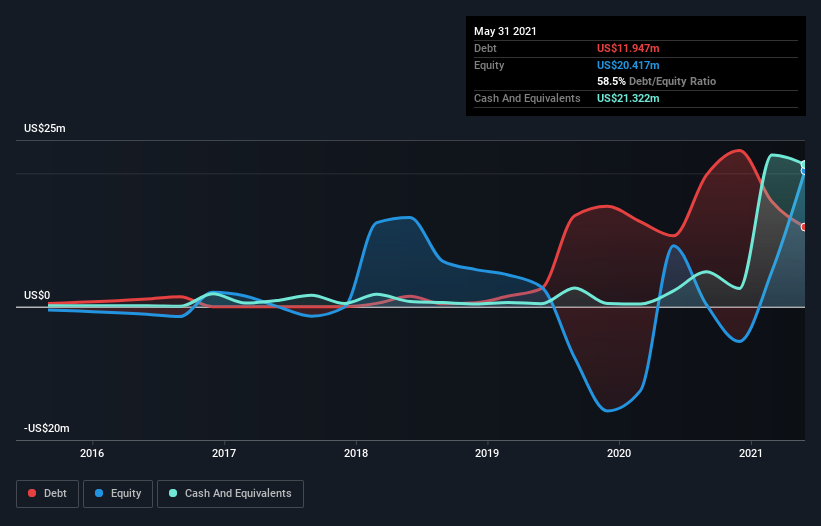Is Engine Gaming and Media (CVE:GAME) Using Debt In A Risky Way?
Howard Marks put it nicely when he said that, rather than worrying about share price volatility, 'The possibility of permanent loss is the risk I worry about... and every practical investor I know worries about.' It's only natural to consider a company's balance sheet when you examine how risky it is, since debt is often involved when a business collapses. We can see that Engine Gaming and Media, Inc. (CVE:GAME) does use debt in its business. But the real question is whether this debt is making the company risky.
What Risk Does Debt Bring?
Debt and other liabilities become risky for a business when it cannot easily fulfill those obligations, either with free cash flow or by raising capital at an attractive price. Part and parcel of capitalism is the process of 'creative destruction' where failed businesses are mercilessly liquidated by their bankers. However, a more usual (but still expensive) situation is where a company must dilute shareholders at a cheap share price simply to get debt under control. Having said that, the most common situation is where a company manages its debt reasonably well - and to its own advantage. The first step when considering a company's debt levels is to consider its cash and debt together.
View our latest analysis for Engine Gaming and Media
What Is Engine Gaming and Media's Net Debt?
As you can see below, at the end of May 2021, Engine Gaming and Media had US$11.9m of debt, up from US$10.6m a year ago. Click the image for more detail. But on the other hand it also has US$21.3m in cash, leading to a US$9.37m net cash position.
A Look At Engine Gaming and Media's Liabilities
According to the last reported balance sheet, Engine Gaming and Media had liabilities of US$39.7m due within 12 months, and liabilities of US$11.2m due beyond 12 months. On the other hand, it had cash of US$21.3m and US$8.88m worth of receivables due within a year. So it has liabilities totalling US$20.7m more than its cash and near-term receivables, combined.
Engine Gaming and Media has a market capitalization of US$58.3m, so it could very likely raise cash to ameliorate its balance sheet, if the need arose. But it's clear that we should definitely closely examine whether it can manage its debt without dilution. Despite its noteworthy liabilities, Engine Gaming and Media boasts net cash, so it's fair to say it does not have a heavy debt load! When analysing debt levels, the balance sheet is the obvious place to start. But it is future earnings, more than anything, that will determine Engine Gaming and Media's ability to maintain a healthy balance sheet going forward. So if you want to see what the professionals think, you might find this free report on analyst profit forecasts to be interesting.
In the last year Engine Gaming and Media wasn't profitable at an EBIT level, but managed to grow its revenue by 787%, to US$33m. That's virtually the hole-in-one of revenue growth!
So How Risky Is Engine Gaming and Media?
Statistically speaking companies that lose money are riskier than those that make money. And we do note that Engine Gaming and Media had an earnings before interest and tax (EBIT) loss, over the last year. Indeed, in that time it burnt through US$26m of cash and made a loss of US$40m. With only US$9.37m on the balance sheet, it would appear that its going to need to raise capital again soon. The good news for shareholders is that Engine Gaming and Media has dazzling revenue growth, so there's a very good chance it can boost its free cash flow in the years to come. While unprofitable companies can be risky, they can also grow hard and fast in those pre-profit years. The balance sheet is clearly the area to focus on when you are analysing debt. However, not all investment risk resides within the balance sheet - far from it. We've identified 5 warning signs with Engine Gaming and Media (at least 2 which are potentially serious) , and understanding them should be part of your investment process.
Of course, if you're the type of investor who prefers buying stocks without the burden of debt, then don't hesitate to discover our exclusive list of net cash growth stocks, today.
This article by Simply Wall St is general in nature. We provide commentary based on historical data and analyst forecasts only using an unbiased methodology and our articles are not intended to be financial advice. It does not constitute a recommendation to buy or sell any stock, and does not take account of your objectives, or your financial situation. We aim to bring you long-term focused analysis driven by fundamental data. Note that our analysis may not factor in the latest price-sensitive company announcements or qualitative material. Simply Wall St has no position in any stocks mentioned.
Have feedback on this article? Concerned about the content? Get in touch with us directly. Alternatively, email editorial-team (at) simplywallst.com.

